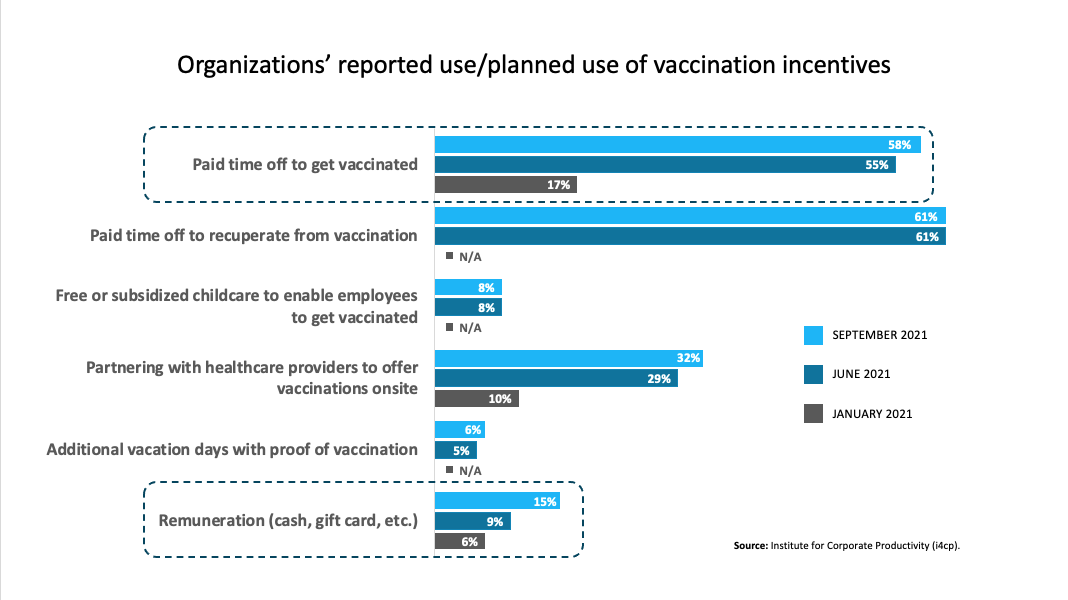Some Employers Are Making Workers Pay for Refusing Vaccinations

Employer response to the Biden administration’s recent COVID-19 vaccination mandate has been swift in some cases, more thoughtful and measured in others, according to the latest research from the Institute for Corporate Productivity (i4cp).
Our September Getting Employees Vaccinated research—the latest in i4cp’s 2021 survey series on pandemic-related issues—polled 534 business and talent professionals about the choices their organizations are making—and considering making—regarding the ongoing COVID-19 pandemic and its impact on organizational performance and workforce well-being.
Some employers (11%) have already begun, or are preparing to implement policies that require unvaccinated workers (those who are not exempt for medical/religious reasons), to shoulder the expense of weekly COVID testing when it is required for access to company workplaces; others (31%) are currently considering this move.
Further, while only 4% of respondents said that their organizations have or will implement a monthly surcharge for healthcare coverage for unvaccinated employees, another 23% are considering doing so.
Other measures currently in very limited use but under consideration: paid and unpaid suspensions and redeployment of unvaccinated employees to remote positions.
In a recent blog—“Employers Are Bracing for Vaccine Mandate Backlash"—we noted that 38% of surveyed business and talent leaders anticipate losing employees if vaccination is made a condition of employment, a result that i4cp CEO Kevin Oakes describes as “realistic and expected because most companies have workers who choose not to be vaccinated.”
What organizations are doing about those employees who refuse vaccinations (and don’t qualify for exemptions) is a burning issue for many leaders at present.
For unvaccinated employees, there are prices to pay
Two of the most pressing questions about unvaccinated employees concern the aforementioned costs for testing and healthcare coverage, and the specter of termination for failure to comply with vaccination mandates.
Responses to the survey reveal an environment in which most companies haven’t made firm decisions about unvaccinated workers yet—evidence of the ongoing (and not unwise) wait-and-see-what-happens approach that has characterized much of the strategic decision-making that’s taken place in the volatile wake of the pandemic’s outbreak.
The survey also asked about eight specific options for dealing with employees who refuse vaccinations and don’t qualify for exemptions. Fifteen percent of respondents—the largest proportion—said they already had or planned to pursue a policy of termination without severance; another 20% were considering that action. While just 4% said their organizations would terminate with severance, another 23% reported that they were weighing that option.
Vaccination incentives reflect several changes
Throughout the year, i4cp research has tracked the use of incentives meant to encourage employees to opt for vaccinations.
The September survey asked about a half-dozen strategies from paid time off to subsidized childcare. There has been little movement since mid-year in the use of most and limited consideration about further changes.
However, although granting paid time off and arranging onsite providers to enable employees to get vaccinated have changed little since June, both have more than tripled in use since the first of the year.
The other notable exception is the use/planned use of remuneration, such as cash or gift cards. Although cited by only 15% of respondents in the current survey, that figure represents a more-than-double percentage jump since the beginning of the year, and a near doubling since June. At present, another 10% of survey participants say they are considering implementing remuneration as a vaccination incentive.
Trends in reported use/planned use of vaccination incentives
Vaccination mandates are appearing in job postings
The importance of constant and effective communications with employees has been repeatedly affirmed by organizational leaders since the onset of the pandemic.
The current survey asked about a dozen communication strategies (up from eight in June) that organizations are using to encourage employees to get vaccinations. Mid-year and now, the most-cited option (55% of respondents) is creating an internal pro-vaccination communications campaign that focuses on employee health and well-being.
Still-popular options to urge vaccinations (cited by 42% or more of respondents) include leveraging personal statements and role modeling by leaders, creating FAQ guides to help managers respond to employee concerns, and adapting existing flu vaccine materials to encourage COVID vaccinations.
Several strategies not cited among the top choices are nevertheless seeing some use now and garnering consideration for future implementation. These actions to watch (and percentages of respondents currently or planning to use them) include:
- Mentioning mandatory vaccination policies in all internal and external job postings (30%)
- Leveraging employee resource groups (ERGs/BRGs) to encourage vaccinations (20%)
- Leveraging ERGs/BRGs to alert leaders to potential issues related to vaccination policies (16%)
- Leveraging influential employees to act as vaccine ambassadors (10%)







